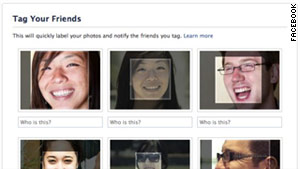 Facebook's computer systems will soon be able to recognize familiar faces.
Facebook's computer systems will soon be able to recognize familiar faces.Facebook is making changes to the process for tagging friends in photos uploaded to the social network, the company announced on Tuesday.
Starting in a few weeks, the system will scan all images posted to Facebook and suggest the names of people who appear in the frame. Last year, Facebook began rolling thefacial-recognition feature out to a test group.
Facebook's more than 500 million users have been automatically included in the database, but the company is allowing each person to choose whether to be identified by toggling a pane in the account's privacy settings. The option is called "suggest photos of me to friends" within the "customize settings" page.
The tool would still scan that person's face and figure out who it is, but it won't display that information. People can still manually tag friends.
The news sparked a small brushfire of media hostility. Bloggers characterized the tool -- and Facebook's decision not to ask before including everyone -- as unsettling while others urged readers to opt out.
Facebook said on Wednesday it had made mistakes with the release. "We should have been more clear with people during the roll-out process when this became available to them," a spokeswoman said. "Tag Suggestions are now available in most countries, and we'll post further updates to our blog over time."
Google recently decided not to release an application that would let someone snap a picture of a person's face using a smartphone in order to find out who the subject is, Eric Schmidt, the search giant's executive chairman and former CEO, said at a conference last week. Schmidt believed it to be the first time Google engineers had completed a project and decided to shutter it for privacy reasons, he said.
The work on Google's facial-recognition technology has not gone to waste. It's used to preserve privacy by blurring faces in Google's Street View mapping project, Hartmut Neven, the engineering director for image recognition, said in a recent interview.




RELATED TOPICS
When asked whether he would be frustrated if Facebook beat his team to releasing a face-recognition product, Neven said: "Let them get burned first. There would be some backlash."
Photo-management software such as Google's Picasa and Apple's iPhoto provide a similar feature. They pore over a person's snapshots in an attempt to group each person together by facial features. Google has not enabled this feature on the online version of its photo software, called Picasa Web Albums.
Limited to a small sampling of the few hundred photos on a person's computer, these systems aren't very accurate.
With the largest photo-sharing service in Facebook scanning millions of pictures daily, these algorithms are no doubt learning quickly. More than 100 million photos per day are uploaded to Facebook, according to a company statement.
The face-scanning feature actually runs counter to Facebook CEO Mark Zuckerberg's comments to reporters in November.
"Before people-tagging came out, I think most people would have said that the best way to figure out who's in photos was to have some face-recognition algorithm," he said. "But it actually turns out that the best way is to just have people tagged."
Some experts agree with Zuckerberg's apparently outdated statements.
"Face technology will never work in gigantic-large databases," said Ipplex CEO Orang Dialameh, who has worked with Neven in the past.
However, "if you limit the database -- say, I'm trying to recognize someone in the 400 contacts that I have on Facebook," then face scanning could be effective, he said.
Facebook users who have installed an app called Photo Finder can already have faces in their photos scanned and identified. The 3-year-old app has looked at more than 23 billion images, said Gil Hirsch, the CEO of Face.com, which develops the service.
With Facebook poised to offer essentially the same functionality, Face.com will instead focus on partnerships with developers, Hirsch wrote in an e-mailed statement Tuesday night. "As long as their products provide value to consumers while protecting their privacy, we will always be supportive of companies using this technology," he said.
No comments:
Post a Comment